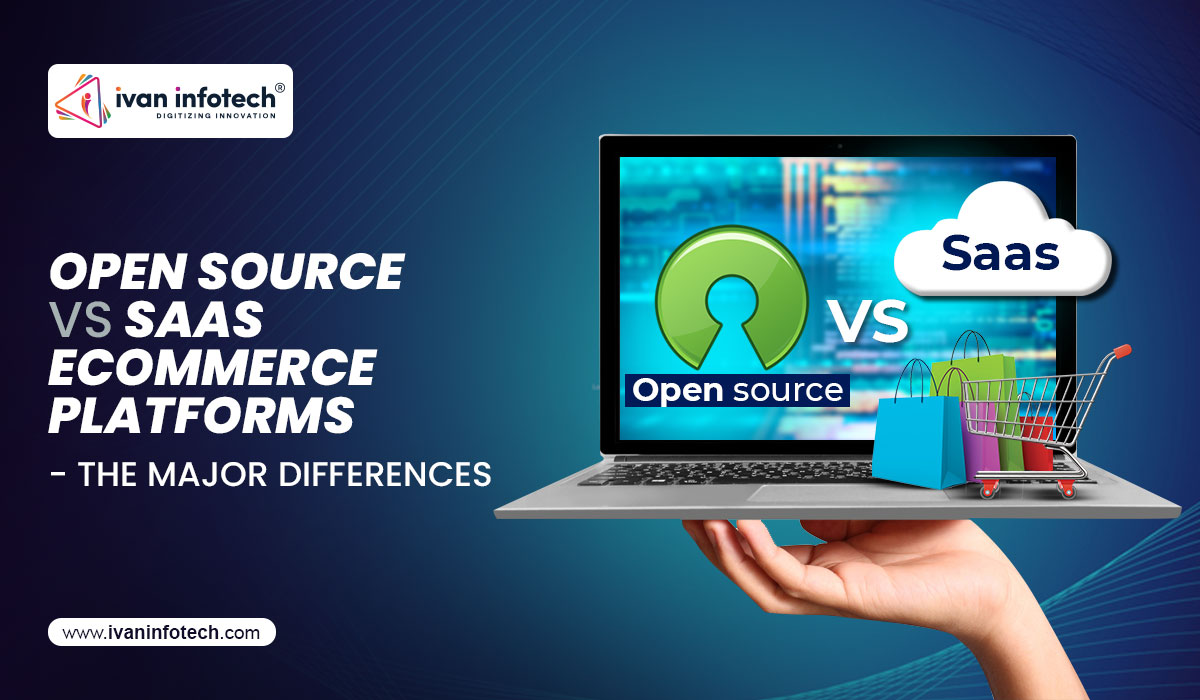
Choosing an Ecommerce Platform
Retailers worldwide are doing everything they can to go digital so as to reach and draw in a higher number of customers and ultimately gain higher sales. Depending on your funds, unique business requirements and challenges you would have to decide if you should go for open-source or SaaS ecommerce platforms.
When it comes to open source development services, you would have complete control over the source code you receive. Accordingly, you can modify and tailor it to cater to your particular needs. On the other hand, the subscription-based model software-as-a-service or SaaS, is developed and supported by external vendors, where businesses can basically rent the solution, and not have to deal with developing or maintaining it.
Let’s delve into the various aspects that distinguish open source from SaaS ecommerce software, as this will help you make an informed decision on what you should choose.
Open Source Vs SaaS- Know The Differences
If a lay person observes an ecommerce site developed using SaaS platform or one built by means of open-source solutions, they may not notice any distinctions between the two. Nonetheless, under the hood you will find many major differences in how each of these platforms work and the way in which ecommerce sites are built on each of them.
Security
One of the main factors while running an ecommerce store is handling shopper data, for instance, payment details, addresses, buying habits, purchase history etc. You would need to make the security and safety of this data a priority or risk losing a considerable number of customers.
Using an ecommerce solution through open source development services would mean that the responsibility to adhere to PCI compliance would be on your shoulders. You would have to make sure your site’s security firewall is free of bugs and select reliable security software to defend your site from external threats.
When it comes to SaaS platforms, you can depend on the full support of your vendor to look after the PCI compliance and security of your ecommerce site.
Cost
On the surface, it may appear that open-source solutions are the more affordable choice. Nonetheless, higher control over your ecommerce site will mean more liability and funds.
Though open-source solutions are freely available to download, you would have to take into account the charges for development, customising, hosting, and making it compliant and secure. And if you run a small company on limited funds, the charges for open source development services can amount to a substantial amount.
Conversely, SaaS platforms usually work on the basis of a monthly or annual subscription. Like renting a house, you pay a fee for as long as you want to use the platform, and your SaaS provider takes care of all the ecommerce functionality, such as product updates, security, hosting and PCI compliance.
Personalisation
Perhaps one of the highly considerable distinctions between SaaS and open source is customising of your ecommerce store.
As you would be able to use the source code as you see fit, open-source solutions give you leeway for full customization, be it the checkout process, themes or product pages. As there won’t be any obstacles, you can fully alter the website to meet your business requirements and offer a distinct customer experience. On the flip side, open-source platforms tend to be highly elaborate, which means that only experienced software providers would be able to provide open source development services.
In terms of SaaS platforms, you will get restricted customization. Your third-party provider would be in control of the source code, you would not have as much liberty to tailor your ecommerce site as you would have using an open-source solution.
Installation
Fortunately, SaaS and open-source platforms call for straightforward installation, you wouldn’t need experts.
Open-source platforms can be installed without cost, yet in terms of arranging and handling your ecommerce store, there are quite a few other costs that would have to be borne. This is where open source development services can be leveraged.
Conversely, SaaS vendors typically give you a free trial where you would be able to check out the solution prior to purchasing the paid version. Also after your site is set up, there will not be any cause for concern that you’d have to begin from scratch, because the third-party vendor manages almost all the backend processes in your stead.
Support and Maintenance
Just like security, ongoing support and maintenance would fall squarely on the shoulders of the open-source platform user. As you have complete flexibility over the software, you would have to look after the administration and infrastructure of your software, together with all updates and upgrades required. In this way, in case there are any problems in your ecommerce environment, the responsibility will lie with you to detect and fix the issue. You can rely on open source development services for ongoing support and maintenance.
Nevertheless, if you are an ecommerce business head who doesn’t want to dedicate resources and energy to maintenance, SaaS solutions serve as a far smarter choice. In the same way as you would rent a property and depend on the property owner to arrange for repairs of a clogged drains or faulty electrical panel, renting a SaaS solution means that the maintenance tasks and support will be covered by your external vendor.
In the end, choosing SaaS or open source development services comes down to each business’s unique needs and priorities. Have you decided what would work best for your business?
Subscribe to the Newsletter
Don’t lag behind in the ever-evolving age. Stay updated with all tech news and trends. We will not fill your inbox with spam mails. You will only receive updates about the cream contents.
Want Assistance with Software Development?
Anything you need in terms of software, you can count on us. With knowledge, skills and years of experience, we create tailor-made, integrated development solutions with high-end technologies.


Categories
Ai software solution
API Development Services
app development
Application Maintenance
AR And VR Software Development
AR Software Development
Artificial Intelligence
Asset Tracking
Automated system
Big Data
Block Chain Development
Blockchain Development Solution
cloud computing solutions
CMS Development Services
Construction Software Solution
CRM
custom web application
Digital Asset Management
Digital Marketing
Digital Services
Ecommerce Industry Solutions
ecommerce solution provider
Education Software Development
education software development Solution
Education Software Solution
ERP Software Development
Event Ticketing Software Solution
Finance Software Solution
Food and beverage software
Graphic Design
Healthcare software solution
hospitality software development solutions
hotel software solution
IMS
IOT
IT application development
IT Consultancy
IT services
IT solutions
Java
Java App Development
Lead Generation Services
Legal Software Development
mobile app design
opensource software development
pos software development Solution
Quality Assurance
Real estate software
Restaurant Software Solution
Retail IT Solutions
Retail Management Software
software development
Software Security
Software Testing
Sports Software Development
Supply Chain Software Solution
Transportation Software Development
Travel & Hospitality
UI and UX design
Uncategorized
Web Design
Web development service
Web Programming